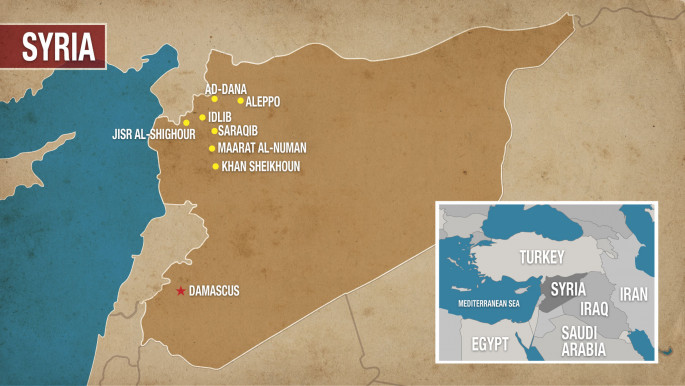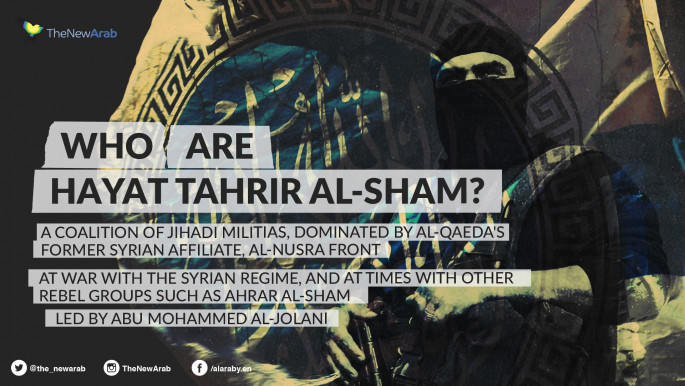Voices of Idlib: What does the future hold for this embattled Syrian city?
"This is the reality of the situation in our city."
The 34-year-old father of three says escaping the daily violence is a struggle, but if he doesn't work, his children will go to sleep hungry.
This hard life is the bleak reality for many Syrians now facing one of the cruelest winters in decades.
"Every day I listen to the news, hoping for some light at the end of this dark tunnel, hoping for an end to this tragedy that we have been living for years, but no good news comes," says Khaled, another resident.
"I have no clue of how the rest of the world is going on normally while we suffer in agony. Officials, meanwhile, meet, negotiate and then postpone discussions one after the other. To them it is like a game, a ball that has been rolling down from a huge mountain but does not find its way to the bottom."
Khaled continues: "We fear every day that there will be car explosions, assassinations or random gunfire. This is not life. Why has the situation become this bad?"
 |
|
Idlib was covered in a ceasefire zone agreed between Russia and Turkey last year, through which airstrikes and shelling on the heavily populated province have been greatly reduced. But the recent takeover of Idlib by Hayat Tahrir al-Sham [HTS], formerly known as the Nusra Front, an al-Qaeda offshoot, has seen Russia and the Syrian regime issue new threats against the region.
The hardline militant group is not considered part of the truce agreement by Moscow.
"Most people hate HTS, but they can do nothing to root them out," said one resident of Kafrnabel, where the group has tightened its grip on a once flourishing activism scene.
Residents also fear the HTS takeover could lead to new bombing by Russian and Syrian regime forces - unless Turkey intervenes, although Ankara appears more focused on the planned US withdrawal from areas of northern Syria controlled by Kurdish and Arab militias.
"Russia and Turkey agreed to 'solve' the [issue of] HTS' foreign fighters jointly, however, the message about the destiny of the land is unclear," explains Ahmad Rahal, a former colonel.
"On the other hand, the US is only re-gathering their ground troops, enabling their forces to be closer to oil sources in Deir az-Zour, where they have begun building two military bases in the north and east."
Rahal adds that Idlib remains "observed and watched by everyone involved in the Syrian war".
"Everyone wants their portion of the cake, while we as residents and owner of land are the last ones to be taken into consideration."
Russia and Turkey have agreed to another meeting on Syria, which will include Iran, but no timetable has yet been set.
"I believe that the leaders have agreed to end the HTS file together with joint plans as announced. However, I'm almost sure that Idlib won't face a campaign of attacks as the Assad regime may wish," said Rahal. "Everyone is aware of the consequences of such foolishness, but there is still uncertainty over the Turkish-Russian plans."
Sharef, a grocery shop owner, migrated from the Syrian city of Homs in 2015. The majority of Idlib's current residents have been displaced during the war. He laments the failed peace talks: "We've experienced countless meetings in the past years, from Sochi, Astana, Geneva, the list goes on. But what has actually happened? Nothing, apart from more division while the war continues in Syria.
"After every meeting what happens in Syria? The currency gets affected, attacks take place somewhere in the country right after each conference, and more importantly, there is never any glimpse of peace."
 |
|
Meanwhile, human rights groups have been documenting cases from north Syria including arrests by HTS.
"We are working on a special report documenting the rise of insecurity northern Syria," said Sara Khayali. "Our reports will be about the wave of kidnappings by known and unknown factions against civilian and activists equally, notably, those who fled from other areas to settle in the Idlib province thinking they would be safe here."
Khayali believes that HTS are afraid of rising opposition figures and thus are "arresting voices implementing Assad's strategy against his opposition with no proof of accusation.
"This precaution against residents must be tackled by HTS allies in order to stop human rights violations and stop this chaos in north Syria. I ought to emphasise that the Assad government will try to twist this situation to launch attacks against the city which should be internationally prohibited and must not be used to legitimise any campaign against the city or north Syria in general."
Ghazwan Kronfol, the CEO of the Syrian lawyer's council in Turkey, told The New Arab: "Factions in north Syria came to the conclusion that their weaponry privilege allows them to force people in the area to kneel to their demands. The large scale of abductions will give Assad's regime reason to launch attacks."
Zouhir al-Shimale is a Syrian journalist from Aleppo.
Follow him on Twitter: @ZouhirAlShimale





 Follow the Middle East's top stories in English at The New Arab on Google News
Follow the Middle East's top stories in English at The New Arab on Google News


